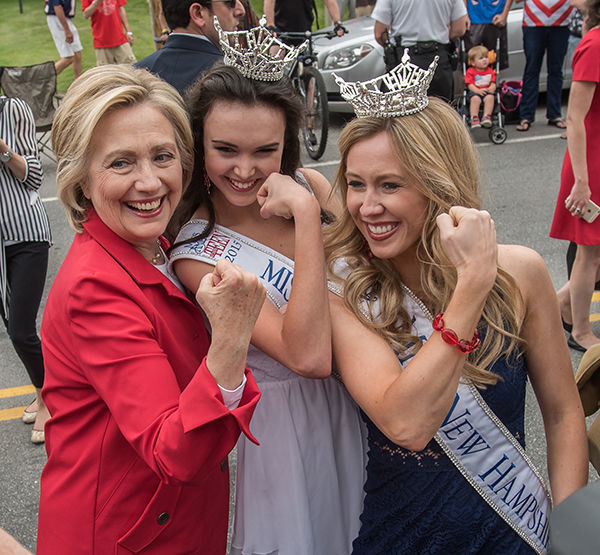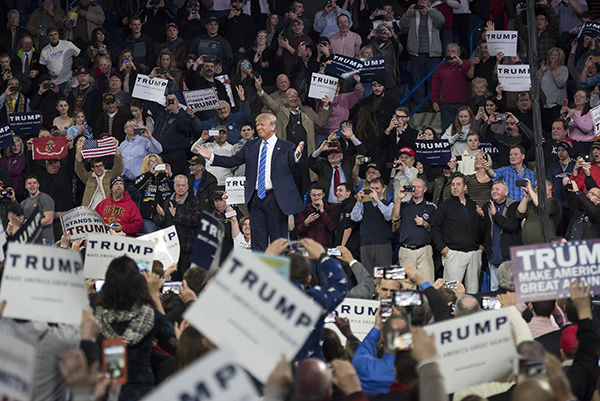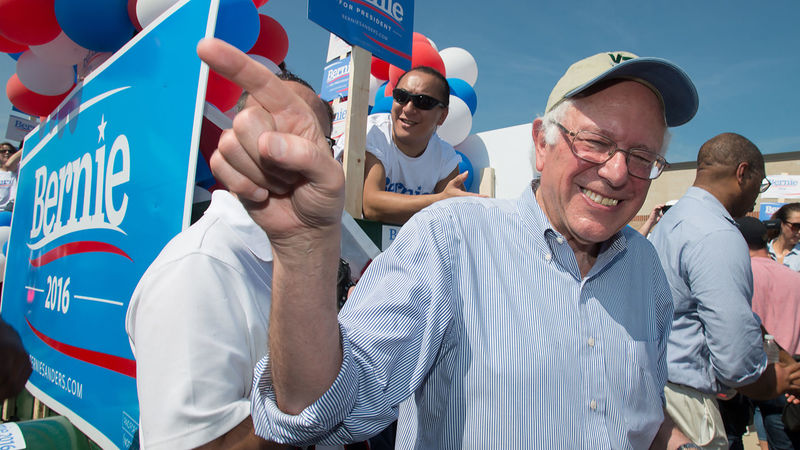My hairdresser plucked the gray hair right out of my scalp and held it up for me to see.
I am 24 years old.
“How many days until the primary?” she asked, eyebrows raised.
I work as a reporter for the Concord Monitor, a local newspaper in New Hampshire, and for months my primary focus had been just that — the state’s February 9th presidential primary. For 100 years now, Granite Staters have cast the first ballots in the contest for the Oval Office. And in 1975, New Hampshire lawmakers made tradition official by passing a law requiring the presidential primary to be held at least a week before any similar election.

I first came to New Hampshire during summer 2012 for an internship at the Monitor, and I was a witness to the buildup to that fall’s general election. I got a scorching sunburn during a Fourth of July parade starring Mitt Romney. I heard Bill Nye the Science Guy stump for President Barack Obama’s re-election bid. But neither those experiences nor past episodes of The West Wing could have prepared me for the true #FITN (first-in-the-nation) experience.
Beginning months before anyone even thought about casting a ballot, wannabe presidents came barnstorming through New Hampshire’s pizza joints, law offices, breweries, elementary schools, college campuses and, yes, actual barns. Along with literally hundreds of other reporters, I’ve followed (been dragged?) along.
This experience has been a lesson in democracy, more mind-boggling at times than any calculus class I ever took.
When Republican billionaire Donald Trump first showed up, many thought he would be a short-lived star. The newspaper’s summer intern from Notre Dame’s journalism program got the beat and, therefore, witnessed the GOP frontrunner offering audience members the chance to feel his hair.
During a Republican debate in Manchester, New Hampshire, in December, I was part of the media throng. There were so many of us that ABC News and host Saint Anselm College set up the press filing center in the hockey arena. Along with a complimentary pen, each reporter received a set of hand and toe warmers.
I went one day without checking my email and later opened my inbox to see more than 100 blasts from campaigns and special interest groups.
At least once a day, I also received emails from lesser-known candidates who paid the $1,000 fee to get their names on the New Hampshire ballot. During the warmer months, one repeatedly offered rounds of golf to entice me to an interview. (Not good enough bait, sorry.) Another, named Vermin Supreme, wandered the state with a boot on his head and actually won fourth place on the Democratic side.
Candidates — their humanity, their oddities — are deeply scrutinized here. Campaigns have been won (Hillary Clinton) or lost (Ed Muskie) on tears shed in New Hampshire. During his first presidential bid in 1999, John Kasich helped a supporter bury her dead dog, a sheltie named Magic. In his pocket, Jeb Bush kept little plastic turtles, a symbol for the trudging campaign he hoped could still win the race.

Even in this age of social media and 24-hour cable news coverage, candidates for the Oval Office still traipse through the Granite State. And more reporters than ever before chase those quirky and quintessential New Hampshire stories, tweeting every sneeze and skewering every misstep.
In a small newsroom with fewer reporters than candidates on the Republican ballot alone, keeping up with the horserace was exhausting and, frankly, impossible. By the time we got to Primary Eve, I was worn out. My desk was a mess of campaign mailers, wrinkled notes, crumpled credentials and almost-dead pens. My hair looked even worse.
And I was discouraged by an argument I regularly had with a coworker throughout the primary season. Super delegates, big money, party insiders — that’s what matters, he would say. The ballots don’t matter.
But as I prepared for a few hours of pre-election sleep, my roommate popped her head into our kitchen to confirm the location of our polling place. She had never voted in New Hampshire before, but she planned to cast her ballot the next day.
I thought about all the people who would do the same — more than 500,000 of them, in the end.
The lore goes something like this: New Hampshire voters want to meet each candidate at least three times before they make up their minds. A native Hoosier, I laughed when I heard that. But it’s not a joke.
Twice on the trail, I saw a member of the audience give a stuffed-animal moose to the candidate on hand. The generous questioner had asked those candidates their positions on climate change; its impact on New Hampshire’s winters has decimated the moose population.
Once, a woman asked Hillary Clinton how to stop telemarketers from calling her house. At another stop, a man gave Ted Cruz a lightsaber. In the final days before the primary, a woman asked Chris Christie to weigh in on a New Hampshire Statehouse debate over bobcat hunting. (His response: “Can I answer honestly? I have no damn idea.”)
I interviewed a dealer in antique documents who told me he believed this election was one of the most important in history. I met a couple who took a weekend trip to New Hampshire from Pennsylvania just so they could meet the candidates in person. I spoke with a young man who drove through a snowstorm to volunteer for a doomed campaign in its final hours.
At midnight, the voters of a little town called Dixville Notch — all nine of them — gathered as they do every year to cast their ballots together.
These voters know they can destroy or deliver a candidate. These people believe their ballots matter. As a reporter, I have interviewed thousands of people, but these conversations were some of my favorites — not for the politics but for the passion.
I drifted off at some point in the middle of those memories. But when I woke up, I remembered another conversation from a couple weeks prior. I had been talking to a longtime New Hampshire official, a regular source of mine, giving him the same countdown my hairdresser asked for — at that point, 15 days.
“I can’t wait for it to be over,” I whined.
He shook his head at me.
“Don’t complain,” he said. “This is fun.”
Formerly a reporter at the Concord Monitor in Concord, New Hampshire, Megan Doyle now works for the Portland Press Herald of Portland, Maine.
